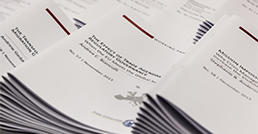New KFG Working Papers Published
Apr 20, 2015
KFG Working Papers
Image Credit: Business Fotografie Inga Haar www.business-fotografie.de/
Last month two KFG Working Papers were published: "Building the ASEAN Center for Humanitarian Assistance and Emergency Response. Is ASEAN Learning from the Experience of the European Civil Protection Mechanism?" by Angela Pennisi di Floristella and "Moving beyond a Donor-Recipient Relationship? Assessing Partnership in the Joint Africa-EU Strategy" by Karen del Biondo.
Abstract for Working Paper No. 62 by Angela Pennisi di Floristella
Why, following the EU’s first attempts at advancing community cooperation in civil protection and the creation of the EU civil protection mechanism, has ASEAN undertaken new initiatives, such as the adoption of a legally binding accord, AADMER and a formal institution, the AHA Center, largely comparable to the institutional innovations endorsed by the EU, in the same issue area? Can these developments be interpreted simply as the result of independent decision-making by ASEAN or are they at least a partial outcome of a transfer process? The aim of this study is to contribute to the emerging debate on European influence in Southeast Asia, taking into account how processes of policy and institutional transfer may lead ASEAN’s region builders to learn from the EU’s experience. Specifically, by discussing the case of disaster management, which has remained largely unexplored by comparative IR literature, this study argues that independent problem solving does not offer an adequate explanation of ASEAN’s developments. Conversely, lesson drawing and emulation are suggested as the two most relevant underlying mechanisms which can explain the gradual and selective adoption of an EU-like model of disaster cooperation.
Click here to view this working paper.
Abstract for Working Paper No. 63 by Karen del Biondo
The Joint Africa-EU Strategy (JAES), which was adopted in 2007, aimed to break with the traditional donor-recipient relationship between the EU and Africa and to develop a true partnership. The concept of partnership has been central in EU-Africa relations ever since the Lomé Agreement (1975), but many have argued that it has been eroded by conditionalities and the end of special trade preferences. Ideally, a partnership is characterized by shared values, equality and trust, but are these principles reflected in the JAES? This study investigates this question by focusing on the thematic partnerships on peace and security and democratic governance and human rights. The paper argues that, despite the power asymmetries between the EU and Africa, the JAES has been characterized by equality in decision-making and by African ownership in capacity-building. However, while the JAES may objectively be based on shared values, the EU and the AU have often differed on how to apply those values in concrete situations, more particularly on the question which type of intervention is acceptable (conditionality, military intervention, etc.). Moreover, the analysis identifies a general feeling of mistrust amongst both parties in the partnership.
Click here to view this working paper.
